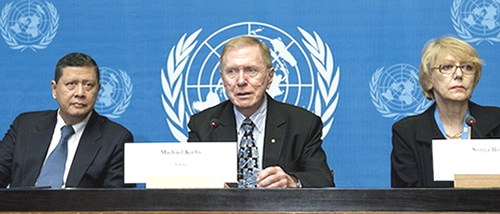23rd September 2013 Geneva, Switzerland
Potty Theory
I’ve often thought that subscribers to chaos theory would do well to spend a week or two watching meetings at the Human Rights Council.
The principal idea is that a small random change at one point can result in major unexpected consequences later on. It would be fascinating to try to catalogue the seemingly minor events which end up with a disproportionate impact on the outcome of UN negotiations. Success or failure can depend on anything from finding a timely space in the UN car park, the ability to track down the UN’s one properly functioning photocopier, or whether you’ve had a sufficient fix of caffeine and gummy bears to keep you alert in meetings.
This session, my ability to make it out of the front door and arrive in time for early morning negotiations has depended largely on the success, or otherwise, of my young son’s potty training. I’m trying to track the impact this has had on the resolutions I’ve been covering and aim to work this up into a thesis entitled Potty Theory.
Week two of the Council session was a frantic affair. Delegates packed in as many meetings as they could before scrambling to finalise the wording of the resolutions they presented by Thursday lunchtime’s deadline. With almost 40 resolutions this session – a record for September – there’s a growing sense that things are getting out of hand.
There’s an ever increasing demand for reports, working groups and Special Rapporteurs on new areas, all of which are putting extra strain on an overloaded human rights system. Everyone knows that we can’t carry on like this, but for the time being, no is doing anything to stop it.
My own team has been busy on some more long-standing issues. Apart from the resolution on contemporary forms of slavery, the UK is among the group of countries leading negotiations on Syria and has been working on a resolution on Somalia in cooperation with the Somali Ambassador.
While the Somalia resolution is focused on providing much needed assistance to Somalia, it does not shy away from the many human rights violations occurring in the country, including sexual violence against women, abuses against children and attacks on journalists. There’s a worrying tendency for Council resolutions presented under the heading of ‘technical assistance’ to ignore the very serious human rights problems in the country concerned.
It is to Somalia’s great credit that it is willing to recognise its own challenges and the resolution sets a fine model for others to follow in the Council.
Regrettably, the resolution on Sudan does not take this approach. The text presented by the African Group is far removed from the reality of Sudan’s dire human rights situation. The rationale for resolutions presented under the heading of technical assistance is that the country concerned is genuinely committed to improving its record.
There is all too little evidence of this in the case of Sudan and let’s hope the African Group will be open to introducing some language reflecting the reality in the country, before the resolution comes up for action.
The Council heard from two Commissions of Inquiry this week. The Chair of the Syria Commission, Paulo Pinheiro provided the latest grim update on Syria, saying that the number of refugees and internally displaced people had now reached 6 million. Among the many concerns raised, he highlighted the impact on children and described a recent attack by the regime on a school in Awrab al-Koubra, when there were no opposition targets nearby, which resulted in the deaths and horrific injuries of students inside.
But the strongest statement of the week was by the Chair of the newly constituted Commission of Inquiry on North Korea, Michael Kirby. The Commission has put victims at the centre of its work, and Justice Kirby relayed some of the powerful witness testimony recently collected by the Commission.

He said, “we think of the testimony of a young man, imprisoned from birth and living on rodents, lizards and grass to survive and witnessing the public execution of his mother and brother; of the testimony of a young woman, forcibly repatriated and imprisoned for leaving, describing how she witnessed a female prisoner forced to drown her own baby in a bucket; of the testimony of a man who was obliged to help load the many corpses of prisoners who died of starvation, put them in a pot and burn them, scattering their ashes and remains on the nearby vegetation fields”.
Justice Kirby said these cases were representative of large-scale patterns which demanded action by the international community and accountability for those responsible.
I’ll let you know how the end of the session pans out. The final week is certain to be a hectic one, especially for those of us who are leading on a resolution as we try to get as much support as possible. It’s the sort of occasion that demands deep breaths and cool heads. Though I hope you excuse me if my struggles to leave the house mean I end up going just a little potty.
Thank you for this informative blog.I too was found it horrifying to read the testimonies to the Comimission of Inquiry on North Korea, but it is important that this information is provided and has an audience.
Carl
Thanks for the comment. The evidence will go into a report to the Council next March, which will then look at next steps. Bob
Thanks for keeping all your readers so involved in the session Bob. Another fascinating blog. I was particularly interested, actually horrified, to read about the testimonies the Comimission of Inquiry on North Korea is hearing. Can you tell us what might happen next with all the evidence they’re collecting?